Presteigne Festival 2025 review - new music is centre stage in the Welsh Marches | reviews, news & interviews
Presteigne Festival 2025 review - new music is centre stage in the Welsh Marches
Presteigne Festival 2025 review - new music is centre stage in the Welsh Marches
Music by 30 living composers, with Eleanor Alberga topping the bill
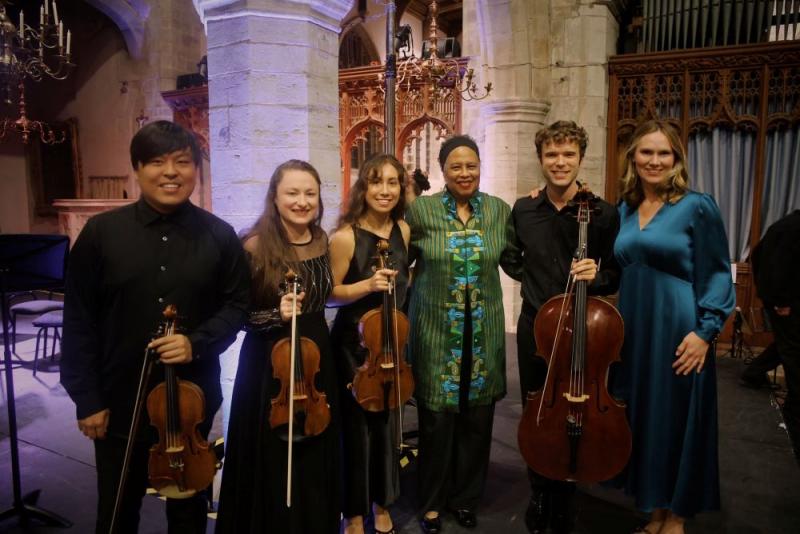
If you were a devotee of Dmitri Shostakovich whose only opportunity to attend some live performances marking this year’s 50th anniversary of his death was spending the weekend of 21 - 25 August at the Presteigne Festival, you probably wouldn’t have felt short-changed.
As the festival’s Composer in Focus, Shostakovich was represented by a deeply-felt performance of his 1934 Cello Sonata, given by Gemma Rosefield and Timothy Horton, cellist and pianist respectively of the Leonore Trio; by his six Spanish Songs (in Russian translations), performed by mezzo-soprano Marta Fontanals-Simmons and pianist Timothy End; by his Second Piano Trio performed with utter commitment by the Leonore Trio; Nos 1 in C and 15 in D flat of his Preludes and Fugues, performed by Timothy Horton; and, to conclude the published programme for the weekend, the Chamber Symphony expanded from his Eighth Quartet by Rudolf Barshai, with the composer’s approval, in 1970. Dying into the gathering darkness with an anguished pianissimo from the Presteigne Festival Orchestra, the end of the symphony expressed the international zeitgeist so vividly that the audience took some time to break into applause. 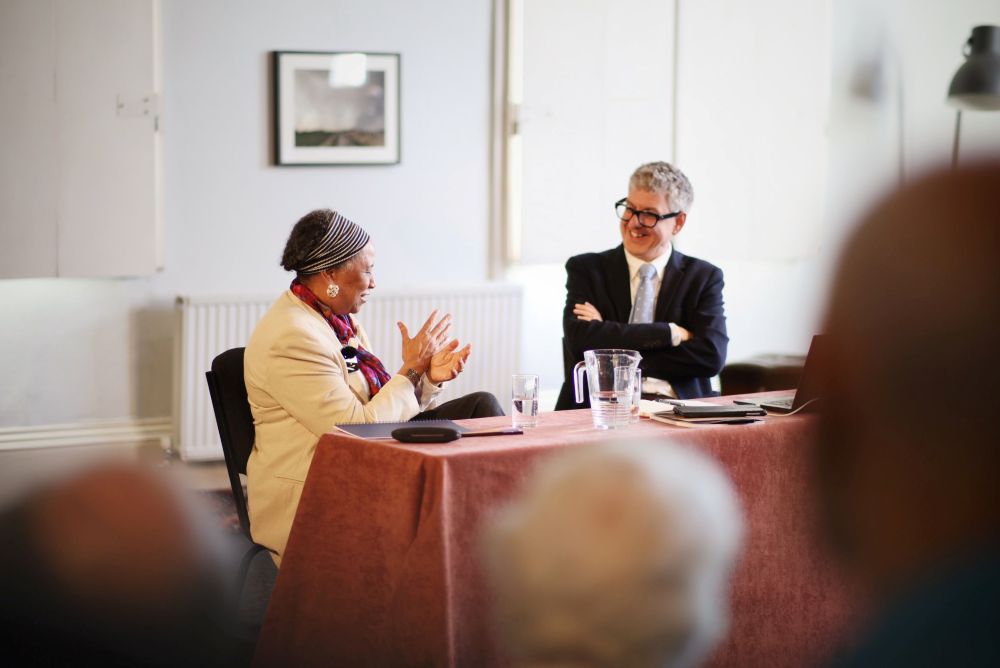 But Presteigne Festival is not really about dead composers, certainly not those who have been dead for 50 years or more. It celebrates contemporary music, much of it hot off the page or computer screen; the 2025 programme included 12 world premieres, two Welsh premieres and music by 32 living composers, many of whom were present at the concerts. And this year the mood was predominantly sunny, thanks literally to the uncharacteristically fine, dry weather weather and metaphorically to the engaging programmes that were warmly received by the festival audience.
But Presteigne Festival is not really about dead composers, certainly not those who have been dead for 50 years or more. It celebrates contemporary music, much of it hot off the page or computer screen; the 2025 programme included 12 world premieres, two Welsh premieres and music by 32 living composers, many of whom were present at the concerts. And this year the mood was predominantly sunny, thanks literally to the uncharacteristically fine, dry weather weather and metaphorically to the engaging programmes that were warmly received by the festival audience.
This was particularly the case with the portfolio of works by Composer in Residence for 2025 Eleanor Alberga, who was born in Kingston, Jamaica, but studied in London as a concert pianist and singer and has lived in England ever since, currently just over the border from Presteigne in Herefordshire. As she explained in a public conversation with fellow composer Thomas Hyde (the two pictured above) on the final afternoon of the festival, she took a long time to realise that she was actually a composer at heart, but her immersion in performance for so many years surely contributed to her understanding of a wide range of instruments and genres – she performed as a concerto soloist and as an accompanist with Robert Cohan’s London Contemporary Dance Theatre, played the guitar and sang with the Jamaican Folk Singers and formed a duo with her husband, violinist Thomas Bowes. Alberga is skilled in writing idiomatically for piano and for strings, and the pieces we heard in Presteigne demonstrated the command of structure and musical narrative that have impressed me since I first heard some of her chamber works performed in London 30 years ago. Her Second Violin Concerto, Narcissus, premiered by Bowes with the NFM Leopoldinum Orchestra in Poland in 2020 and performed in Presteigne by Benjamin Nabarro (pictured below with George Vass), violinist of the Leonore Trio, with the Presteigne Festival Orchestra, was a highlight of the weekend. Nabarro was totally in command of its long, lyrical lines and it was the piece everyone was still talking about at the end of the festival. 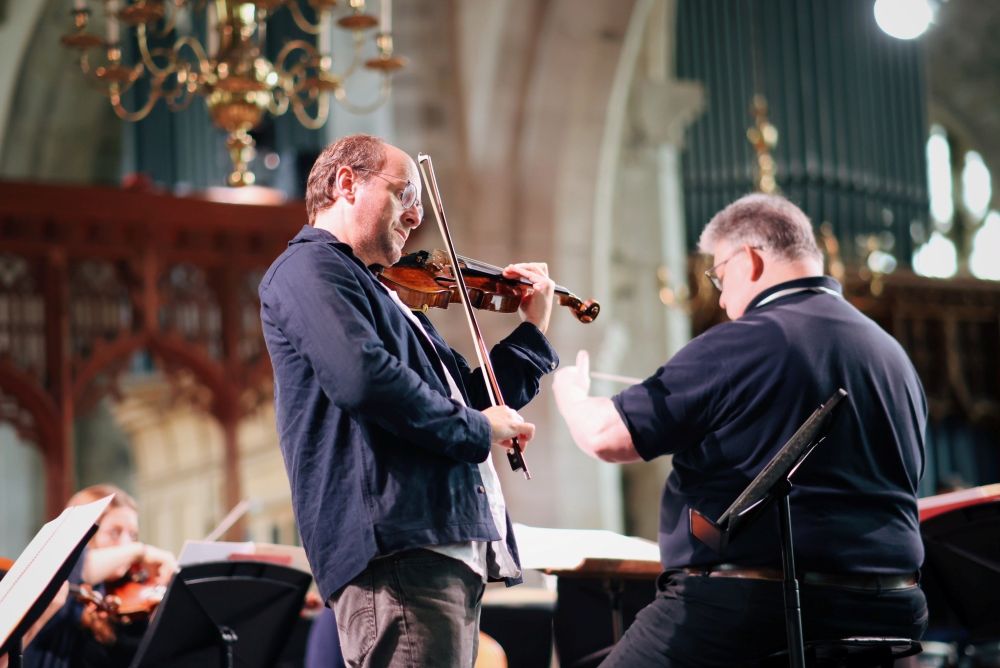 Alberga’s song cycle Glimpses, Glances, performed by Fontanals-Simmons and the Goethe Quartet , was perhaps less immediately successful, despite an excellent performance – both text and music are rich and complex, and while I felt these are songs I could grow to love if I had the chance to hear them frequently, other listeners felt they needed a simpler setting with more moments of stillness.
Alberga’s song cycle Glimpses, Glances, performed by Fontanals-Simmons and the Goethe Quartet , was perhaps less immediately successful, despite an excellent performance – both text and music are rich and complex, and while I felt these are songs I could grow to love if I had the chance to hear them frequently, other listeners felt they needed a simpler setting with more moments of stillness.
There was a similar issue with the semi-staged treatment of Scenes from Under Milk Wood presented by Nova Music Opera (pictured below) on the first night of the festival. Audience members near me who were evidently familiar with Dylan Thomas’s original work were chortling merrily, but they seemed to be in a minority; I found it difficult to engage with the characters, partly because Ninfea Cruttwell-Reade’s exquisite orchestral score, full of delicate colour and beautifully played by a small ensemble, was a distraction rather than a vehicle for the text. 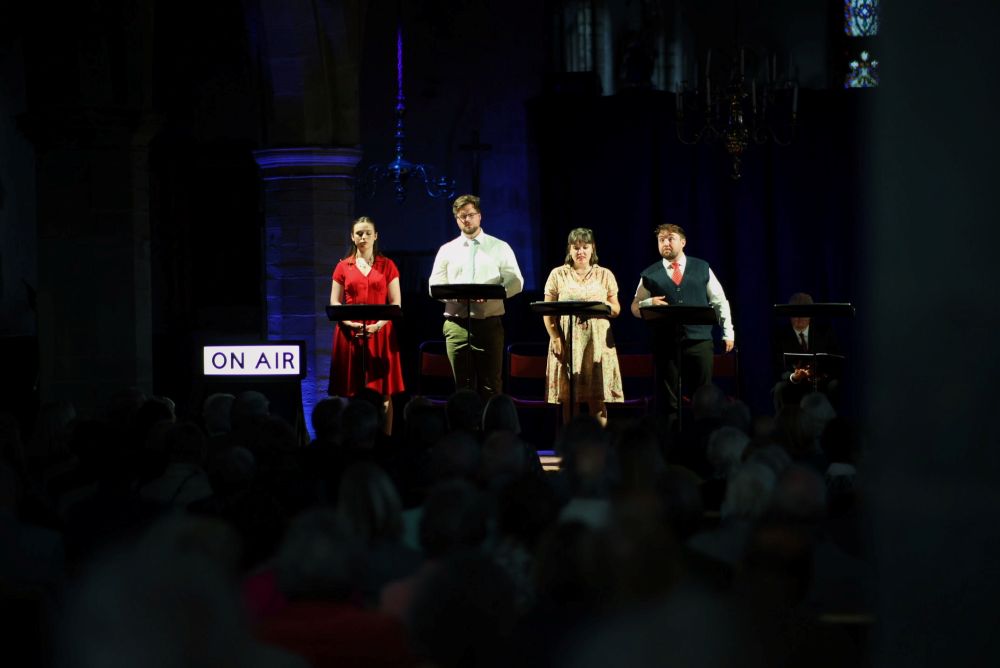 The piece was presented as though being performed in a radio studio, as was Dylan Thomas's original play, with an “On Air” light to one side of the stage, and the narrator, two singers and two actors dressed to suggest the 1950s, reading their scores / scripts from music stands. Mezzo-soprano Rebecca Afonwy-Jones made the most impact, singing with her usual warm eloquence and switching character skilfully; baritone Thomas Humphreys had less to sing but was in equally good voice. Most frustrating was a duet in which he and Afonwy-Jones took alternate verses but were never brought together. What stayed with me was the luminous soundworld of the accompaniment, particularly its magical combination of vibraphone and harp.
The piece was presented as though being performed in a radio studio, as was Dylan Thomas's original play, with an “On Air” light to one side of the stage, and the narrator, two singers and two actors dressed to suggest the 1950s, reading their scores / scripts from music stands. Mezzo-soprano Rebecca Afonwy-Jones made the most impact, singing with her usual warm eloquence and switching character skilfully; baritone Thomas Humphreys had less to sing but was in equally good voice. Most frustrating was a duet in which he and Afonwy-Jones took alternate verses but were never brought together. What stayed with me was the luminous soundworld of the accompaniment, particularly its magical combination of vibraphone and harp.
The Presteigne Festival makes heavy demands on the performers, tasked with learning so much unfamiliar music, with little time to recover from one challenging programme before meeting up with colleagues to put the final touches to the next. Typically there will be a string quartet, another chamber group, and several soloists including one or two singers and two pianists in the residence every year, plus a choir and the festival's small professional string ensemble. This year's award for courage goes to the young Goethe Quartet, engaged at short notice to tackle repertoire originally intended for the Castalian Quartet. This included Thomas Adès’s Arcadiana, which it was a real treat to hear; very little of his music has been performed at Presteigne. 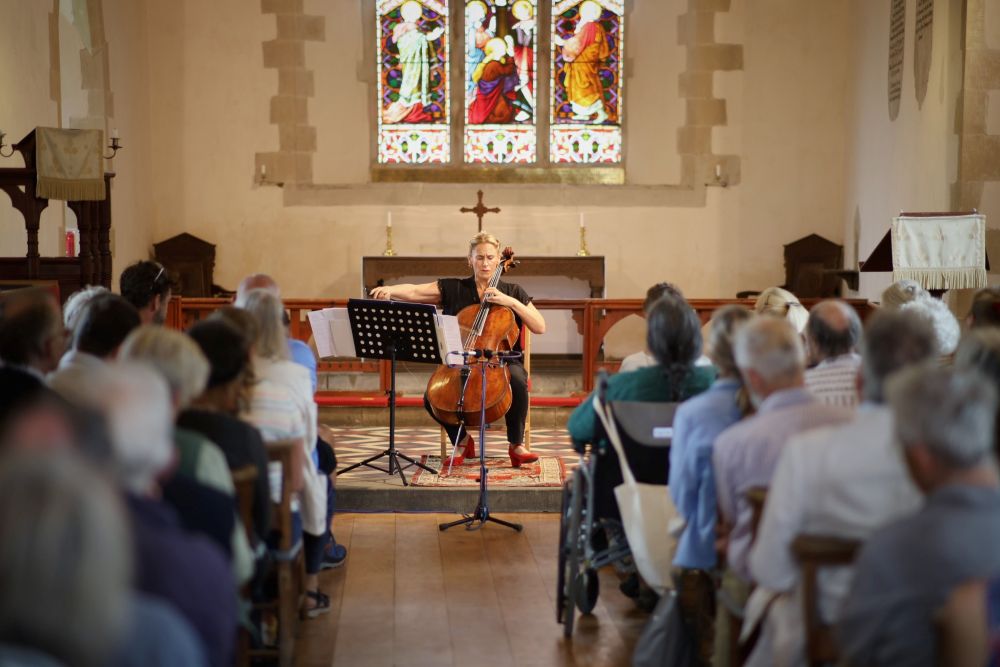 It is difficult to think of another festival where an audience consisting mainly of amateur music lovers, albeit with a strong contingent of composers in their midst, listens happily to concert after concert that includes not one piece that they have ever heard before. Huddersfield Contemporary Music Festival is university-based and attracts a much younger, more specialist audience; Aldeburgh, on a much larger scale and backed by the wealth and prestige of the Britten Estate, is probably the closest equivalent. Presteigne, a small town in the Welsh Marches, attracts a loyal band of local people and a contingent of regular visitors from elsewhere in the UK to its main performance venue, the medieval parish church of St Andrew, which has a beautiful acoustic (and very comfortable seats).
It is difficult to think of another festival where an audience consisting mainly of amateur music lovers, albeit with a strong contingent of composers in their midst, listens happily to concert after concert that includes not one piece that they have ever heard before. Huddersfield Contemporary Music Festival is university-based and attracts a much younger, more specialist audience; Aldeburgh, on a much larger scale and backed by the wealth and prestige of the Britten Estate, is probably the closest equivalent. Presteigne, a small town in the Welsh Marches, attracts a loyal band of local people and a contingent of regular visitors from elsewhere in the UK to its main performance venue, the medieval parish church of St Andrew, which has a beautiful acoustic (and very comfortable seats).
One or two concerts take place in smaller churches in outlying villages – this year flautist Chloë Vincent and harpist Olivia Jageurs performed in Leintwardine, the Erda Ensemble made their festival debut at Bleddfa, and the little shepherd’s church of St Michael’s, Discoed, a couple of miles into the hills above Presteigne, was the setting for a recital by violinists Emma Roijackers and Laura Rickard that included the Welsh premiere of Five Vignettes by Martin Butler, and for a wonderful solo recital by Gemma Rosefield (pictured above). 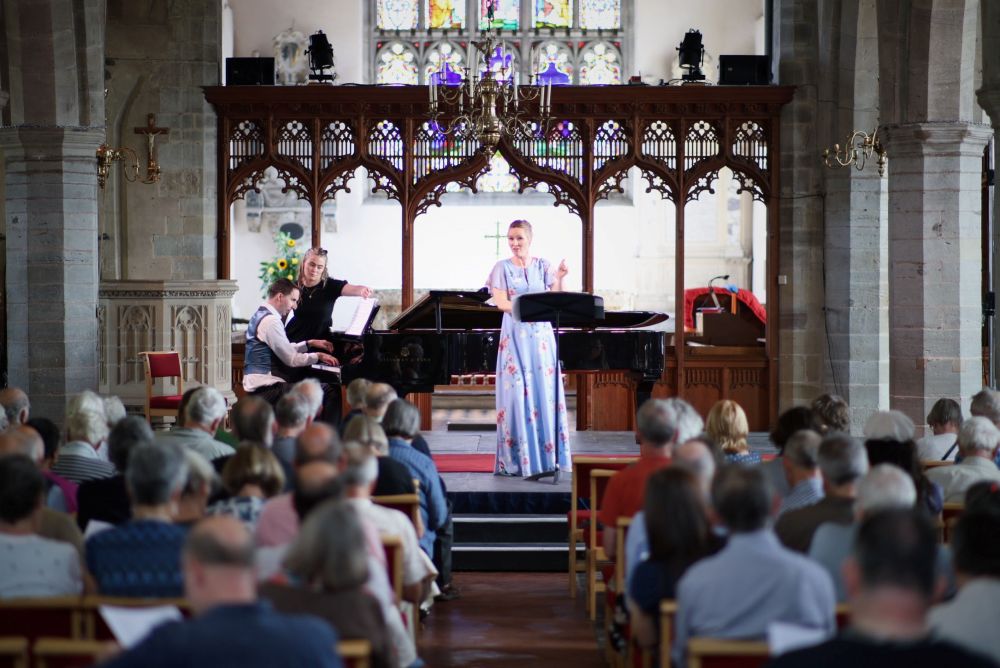 Opening with the world premiere of Edward Gregson’s suite Dances Old and New and closing with Bach’s Suite in D minor BWV1008, bookending shorter and delightfully contrasting works by Dani Howard, Edmund Finnis and Eleanor Alberga, Rosefield’s recital demonstrated the skilful programming that is George Vass’s hallmark and which was particularly in evidence this year.
Opening with the world premiere of Edward Gregson’s suite Dances Old and New and closing with Bach’s Suite in D minor BWV1008, bookending shorter and delightfully contrasting works by Dani Howard, Edmund Finnis and Eleanor Alberga, Rosefield’s recital demonstrated the skilful programming that is George Vass’s hallmark and which was particularly in evidence this year.
Musical and non-musical themes ran subtly through individual concerts and through the festival as a whole; a moment of lightness came just when the audience needed it, as in the recital by Marta Fontanals-Simmons and Timothy End (pictured above) when two humorous songs by Thomas Hyde (described as ‘pendants’ to his as yet unperformed opera Aiding and Abetting, which has a libretto by Alexander McCall Smith) followed the intensity of the Shostakovich Spanish/Russian songs and the premiere of a reduced version of Four Faerie Folk Songs by Gavin Higgins, performed in Welsh and originally woven through his marvellous cantata for choir, orchestra and soloists The Faerie Bride, premiered in 2023 at the Gloucester Three Choirs Festival. This programme also featured John Casken’s atmospheric Ghost Songs, setting poems by Thomas Hardy, powerfully delivered by both performers, who captured the drama and suspense perfectly. 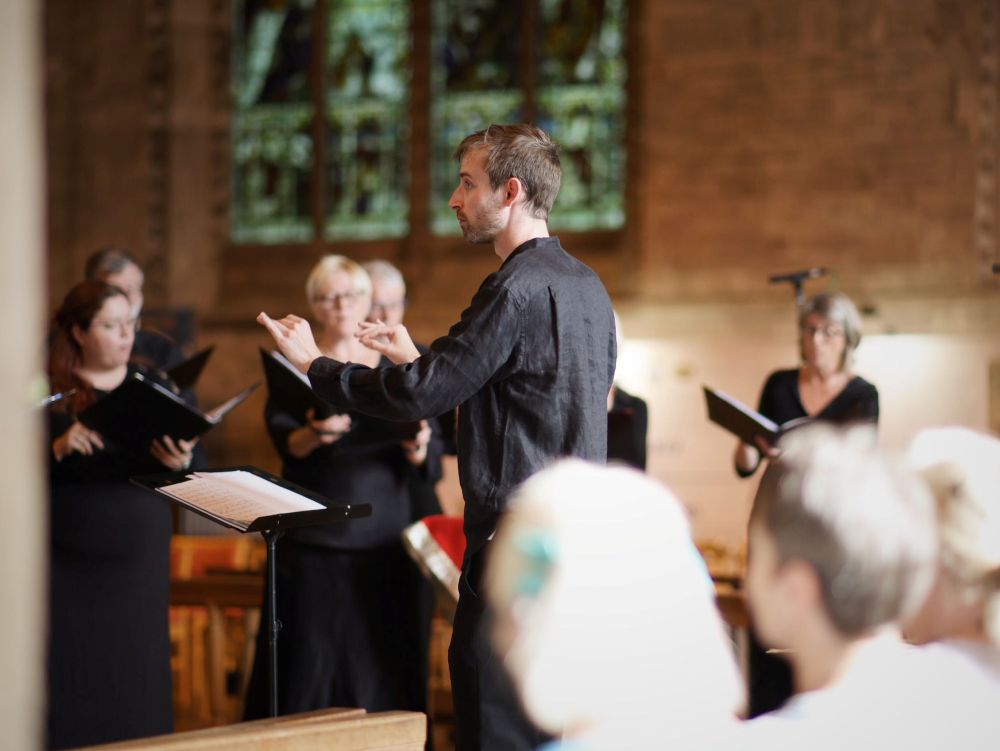 This year’s resident choir was Bath Camerata, visiting Presteigne for the second time, with a new conductor, Robert Brooks (pictured above), whose engaging and informative spoken introductions to some of the pieces in their Sunday afternoon recital in Leominster Priory were a model that could usefully have been adopted for some of the instrumental concerts. Separate pre-concert talks used to be the norm at Presteigne, but were replaced with briefer on-stage chants following the pandemic, scaled back still further this year to one or two sentences from the composers ahead of some of the premieres. Bath Camerata also led the music at the Festival Eucharist in St Andrew’s Presteigne, with organist Edward Kemp- Luck, which meant we had two chances to hear them perform Caroline Shaw’s increasingly popular … and the swallow and their festival commission, a lovely Ave Maria by Kerensa Briggs, both of which were included in their a cappella programme in Leominster, the latter in a trio of Marian anthems alongside Judith Weir’s Ave regina coelorum and Cecilia McDowall’s Regina caeli.
This year’s resident choir was Bath Camerata, visiting Presteigne for the second time, with a new conductor, Robert Brooks (pictured above), whose engaging and informative spoken introductions to some of the pieces in their Sunday afternoon recital in Leominster Priory were a model that could usefully have been adopted for some of the instrumental concerts. Separate pre-concert talks used to be the norm at Presteigne, but were replaced with briefer on-stage chants following the pandemic, scaled back still further this year to one or two sentences from the composers ahead of some of the premieres. Bath Camerata also led the music at the Festival Eucharist in St Andrew’s Presteigne, with organist Edward Kemp- Luck, which meant we had two chances to hear them perform Caroline Shaw’s increasingly popular … and the swallow and their festival commission, a lovely Ave Maria by Kerensa Briggs, both of which were included in their a cappella programme in Leominster, the latter in a trio of Marian anthems alongside Judith Weir’s Ave regina coelorum and Cecilia McDowall’s Regina caeli.
One of the UK’s best amateur chamber choirs, the Camerata coped well with a tiring recital programme, keeping some energy in reserve for the concluding set of six choral songs by Jonathan Dove, The Sun has Burst the Sky, written for the choir in memory of one of their members, Hannah Shaw, following her very early death and reflecting her love of music, dancing and languages, especially Spanish. The previous evening they had joined the festival orchestra under the baton of George Vass to perform – very well – another McDowall piece, her Da Vinci Requiem, which combines texts from the Latin Mass for the Dead with extracts from Leonardo’s notebooks, to thought-provoking effect. To my mind this is a masterpiece of choral writing; having very much enjoyed Wimbledon Choral Society’s recording, I was delighted to hear the Requiem live for the first time, with Eleanor Rolfe Johnson as the commanding soprano soloist.
The concert had opened with Cheryl Frances-Hoad’s cantata With What Sudden Joy, commissioned for last year’s tenth anniversary of Southwell Festival in Nottinghamshire. This very fine, substantial piece, celebrating the power of music in connecting communities and individuals, was undersold in the festival pre-publicity and perhaps slightly under-rehearsed in Presteigne, no doubt due to time constraints; the choir appeared less confident than they were in the Requiem, but the audience member behind me who exclaimed at the end in tones of admiration "well, I wasn’t expecting that!" and another who gasped "Wow!" in response to the cantata itself were echoing my own thoughts. 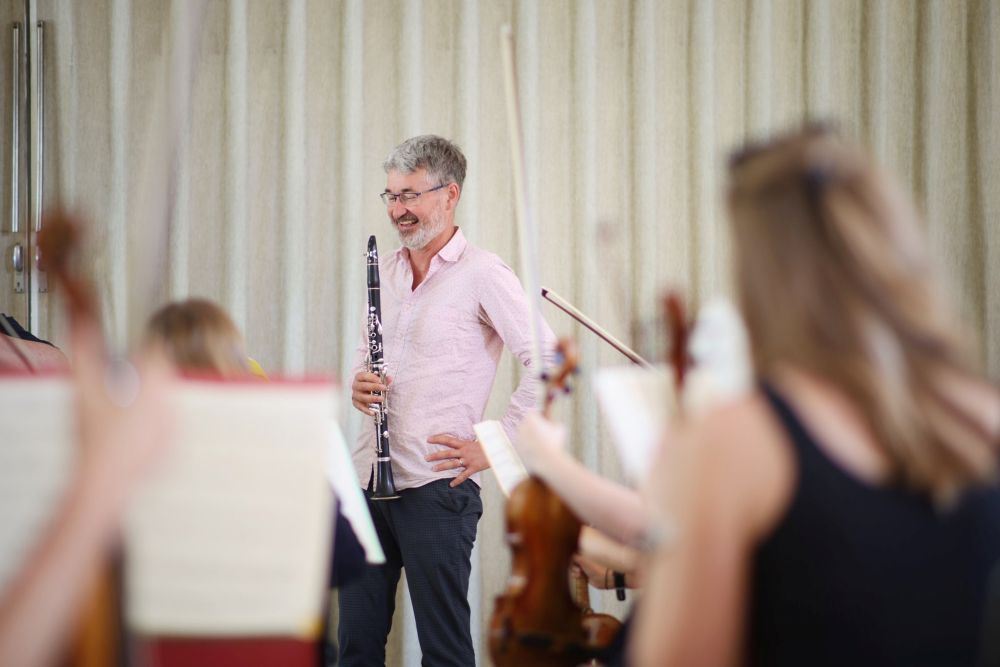 Other musical highlights of the weekend included a magisterial solo recital by Horton on the final afternoon, and the contributions of clarinettist Robert Plane (pictured above in rehearsal), soloist with the Goethes in Mozart’s Clarinet Quintet and with the festival orchestra in a delightful new Concertino by Huw Watkins. And the work of documentary filmmaker Barrie Gavin, who died last year having lived a few miles from Presteigne for many years, was celebrated in a discussion chaired by Michael Berkeley, a close friend who presented several of Gavin’s TV documentaries about classical music. There were contributions from composers David Matthews and Thomas Hyde on the panel and former BBC colleagues Peter Maniura and David Stevens from the floor. Paying tribute to Gavin’s deep knowledge and understanding of music, literature and visual art, his meticulous planning and his ability to let the music speak for itself, they cited his work with composers such as Michael Tippett, Pierre Boulez, Jonathan Harvey, Toru Takemitsu, Oliver Knussen, George Benjamin and Matthews himself, and came to the conclusion that he was probably the greatest maker of documentaries on classical music the world has known.
Other musical highlights of the weekend included a magisterial solo recital by Horton on the final afternoon, and the contributions of clarinettist Robert Plane (pictured above in rehearsal), soloist with the Goethes in Mozart’s Clarinet Quintet and with the festival orchestra in a delightful new Concertino by Huw Watkins. And the work of documentary filmmaker Barrie Gavin, who died last year having lived a few miles from Presteigne for many years, was celebrated in a discussion chaired by Michael Berkeley, a close friend who presented several of Gavin’s TV documentaries about classical music. There were contributions from composers David Matthews and Thomas Hyde on the panel and former BBC colleagues Peter Maniura and David Stevens from the floor. Paying tribute to Gavin’s deep knowledge and understanding of music, literature and visual art, his meticulous planning and his ability to let the music speak for itself, they cited his work with composers such as Michael Tippett, Pierre Boulez, Jonathan Harvey, Toru Takemitsu, Oliver Knussen, George Benjamin and Matthews himself, and came to the conclusion that he was probably the greatest maker of documentaries on classical music the world has known.
The festival also offered three non-music-related films, in association with Presteigne Screen, and an impressive selection of fascinating talks by expert speakers. I heard Nicholas Murray on the Bloomsbury Group, marking the centenary of the publication of Virginia Woolf’s Mrs Dalloway; Peter Wakelin providing an introduction to The Art of Radnorshire, which he will be exploring in a chapter for a forthcoming history of the historic county (now absorbed into Powys); and Gavin Plumley setting the life and work of painter John Singer Sargent in context with erudite panache. Alongside the main festival, around 60 local painters, sculptors and craftspeople were exhibiting their work in at least 20 venues around town under the banner of Presteigne Open Studios, a hugely popular enterprise which meant the high street and its shops, pubs and cafés were thronged throughout the weekend.
An innovation in this strand was an exhibition of work by young people who have been participating in a new after-school programme led by The Sidney Nolan Trust, based at The Rodd, the Australian artist’s former home just outside Presteigne. In addition to a multi-media presentation in an empty shop unit which they shared with violin-maker Paul Conway, a series of larger-than-life photographic portraits of Presteigne residents was displayed on fences on either side of the leisure centre and the secondary school, attracting an enormous amount of interest. 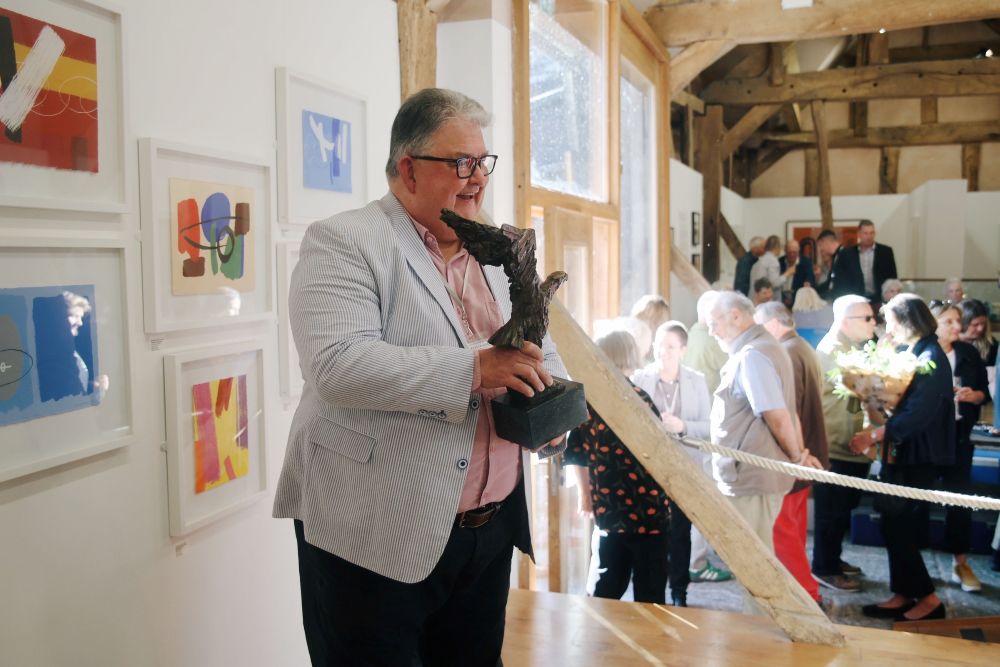 The Rodd was the venue for a very special event right at the start of the festival. Harriet Wybor, general manager of the Royal Philharmonic Society (RPS), announced that George Vass is this year’s winner of the RPS Leslie Boosey Award, in recognition of his "bold and unwavering commitment to programming contemporary British composers throughout his career, including as Artistic Director of Presteigne Festival for over 30 years".
The Rodd was the venue for a very special event right at the start of the festival. Harriet Wybor, general manager of the Royal Philharmonic Society (RPS), announced that George Vass is this year’s winner of the RPS Leslie Boosey Award, in recognition of his "bold and unwavering commitment to programming contemporary British composers throughout his career, including as Artistic Director of Presteigne Festival for over 30 years".
Explaining that the award is not given to composers or performers, but to programmers, publishers, broadcasters, administrators, educationalists and figures from the recording industry, the people who work tirelessly "backstage" to champion new music, she presented Vass with the enormous bronze eagle commissioned by the RPS from Elizabeth Frink (Vass with the sculpture pictured above), adding that "Presteigne Festival devotees and composers alike will know that bringing new music to life requires hard work and dedication. Not just from those writing and performing music on stage, but from those with the vision to encourage composers to share their imagination, to support them in their creative endeavours through commissions and mentoring, and to programme exciting new music for audiences to hear."
No-one who attended the following five days of inspiring and stimulating concerts could possibly dispute the justification for this richly deserved accolade. 2025 was without question a vintage Presteigne Festival.
Explore topics
Share this article
The future of Arts Journalism
You can stop theartsdesk.com closing!
We urgently need financing to survive. Our fundraising drive has thus far raised £49,000 but we need to reach £100,000 or we will be forced to close. Please contribute here: https://gofund.me/c3f6033d
And if you can forward this information to anyone who might assist, we’d be grateful.

Subscribe to theartsdesk.com
Thank you for continuing to read our work on theartsdesk.com. For unlimited access to every article in its entirety, including our archive of more than 15,000 pieces, we're asking for £5 per month or £40 per year. We feel it's a very good deal, and hope you do too.
To take a subscription now simply click here.
And if you're looking for that extra gift for a friend or family member, why not treat them to a theartsdesk.com gift subscription?
more Classical music
 Presteigne Festival 2025 review - new music is centre stage in the Welsh Marches
Music by 30 living composers, with Eleanor Alberga topping the bill
Presteigne Festival 2025 review - new music is centre stage in the Welsh Marches
Music by 30 living composers, with Eleanor Alberga topping the bill
 Lammermuir Festival 2025 review - music with soul from the heart of East Lothian
Baroque splendour, and chamber-ensemble drama, amid history-haunted lands
Lammermuir Festival 2025 review - music with soul from the heart of East Lothian
Baroque splendour, and chamber-ensemble drama, amid history-haunted lands
 BBC Proms: Steinbacher, RPO, Petrenko / Sternath, BBCSO, Oramo review - double-bill mixed bag
Young pianist shines in Grieg but Bliss’s portentous cantata disappoints
BBC Proms: Steinbacher, RPO, Petrenko / Sternath, BBCSO, Oramo review - double-bill mixed bag
Young pianist shines in Grieg but Bliss’s portentous cantata disappoints
 theartsdesk at the Lahti Sibelius Festival - early epics by the Finnish master in context
Finnish heroes meet their Austro-German counterparts in breathtaking interpretations
theartsdesk at the Lahti Sibelius Festival - early epics by the Finnish master in context
Finnish heroes meet their Austro-German counterparts in breathtaking interpretations
 Classical CDs: Sleigh rides, pancakes and cigars
Two big boxes, plus new music for brass and a pair of clarinet concertos
Classical CDs: Sleigh rides, pancakes and cigars
Two big boxes, plus new music for brass and a pair of clarinet concertos
 Waley-Cohen, Manchester Camerata, Pether, Whitworth Art Gallery, Manchester review - premiere of no ordinary violin concerto
Images of maternal care inspired by Hepworth and played in a gallery setting
Waley-Cohen, Manchester Camerata, Pether, Whitworth Art Gallery, Manchester review - premiere of no ordinary violin concerto
Images of maternal care inspired by Hepworth and played in a gallery setting
 BBC Proms: Barruk, Norwegian Chamber Orchestra, Kuusisto review - vague incantations, precise laments
First-half mix of Sámi songs and string things falters, but Shostakovich scours the soul
BBC Proms: Barruk, Norwegian Chamber Orchestra, Kuusisto review - vague incantations, precise laments
First-half mix of Sámi songs and string things falters, but Shostakovich scours the soul
 BBC Proms: Alexander’s Feast, Irish Baroque Orchestra, Whelan review - rapturous Handel fills the space
Pure joy, with a touch of introspection, from a great ensemble and three superb soloists
BBC Proms: Alexander’s Feast, Irish Baroque Orchestra, Whelan review - rapturous Handel fills the space
Pure joy, with a touch of introspection, from a great ensemble and three superb soloists
 BBC Proms: Moore, LSO, Bancroft review - the freshness of morning wind and brass
English concert band music...and an outlier
BBC Proms: Moore, LSO, Bancroft review - the freshness of morning wind and brass
English concert band music...and an outlier
 Willis-Sørensen, Ukrainian Freedom Orchestra, Wilson, Cadogan Hall review - romantic resilience
Passion, and polish, from Kyiv's musical warriors
Willis-Sørensen, Ukrainian Freedom Orchestra, Wilson, Cadogan Hall review - romantic resilience
Passion, and polish, from Kyiv's musical warriors
 BBC Proms: Faust, Gewandhausorchester Leipzig, Nelsons review - grace, then grandeur
A great fiddler lightens a dense orchestral palette
BBC Proms: Faust, Gewandhausorchester Leipzig, Nelsons review - grace, then grandeur
A great fiddler lightens a dense orchestral palette
 BBC Proms: Jansen, Royal Concertgebouw Orchestra, Mäkelä review - confirming a phenomenon
Second Prom of a great orchestra and chief conductor in waiting never puts a foot wrong
BBC Proms: Jansen, Royal Concertgebouw Orchestra, Mäkelä review - confirming a phenomenon
Second Prom of a great orchestra and chief conductor in waiting never puts a foot wrong

Add comment